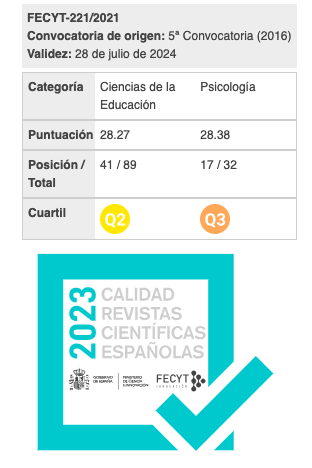Social Competencies and Expectations Regarding the Impending Transition to Secondary School
Keywords:
Downloads
Abstract
Changing from elementary to secondary school is a life event that every child has to pass. Previous research has shown that some children feel more threatened by the transition than others. In the present study children’s expectations concerning the impending transition to secondary school were analyzed and it was investigated how individual levels of social competencies, aggressive behavior, peer-acceptance and victimization experiences are related to the expectations regarding the transition to secondary school. The results demonstrated that empathy and aggression are strongly related to the perception of the impending transition as challenge whereas victimization and peer-acceptance were related to the perception of the transition as threat. Furthermore, with the help of a cluster analysis, four groups of children showing different patterns of expectations were identified. The findings give valuable information about children’s perceptions of the impending school transition. It is discussed how teachers could support children to cope better with transition processes.
Downloads
References
Anderson, L. W., Jacobs, J. , Schramm, S., & Splittgerber, F. (2000). School transitions: beginning of the end or a new beginning? International Journal of Educational Research, 33, 325-339.
Google Scholar CrossrefAsendorpf, J. B., & van Aken, M. A. G. (1993). Deutsche Versionen der Selbstkonzeptskalen von Harter [German versions of the Self-Perception Profile by Harter]. Zeitschrift für Entwicklungspsychologie und Pädagogische Psychologie, 25, 64-86.
Google Scholar CrossrefBall, J., Lohaus, A., & Miebach, C. (2006). Psychische Anpassung und schulische Leistungen beim Wechsel von der Grundschule zur weiterführenden Schule [Psychological adjustment and school achievement during transition from elementary to secondary school]. Zeitschrift für Entwicklungspsychologie und Pädagogische Psychologie, 38, 101-109.
Google Scholar CrossrefBerndt, T. J., & Mekos, D. (1995). Adolescents’ perceptions of the stressful and desireable aspects of the transition to junior high school. Journal of Research on Adolescence, 5, 123-142.
Google Scholar CrossrefDubow, E. F., & Tisak, J. (1989). The relation between stressful life events and adjustment in elementary school children: The role of social support and social problem-solving skills. Child Development, 60, 1412-1423.
Google Scholar CrossrefDurlak, J. A., Weissberg, R. P., Dymnicki, A. B., Taylor, R. D., & Schellinger, K. B. (2011). The impact of enhancing students’ social and emotional learning: A meta-analysis of school-based universal interventions. Child Development, 82, 405-432.
Google Scholar CrossrefEichhorn, C. (2012). Classroom-Management: Wie Lehrer, Eltern und Schüler guten Unterricht gestalten [Classroom Management: How Teachers, Parents and Pupils Can Establish Good Class Education]. Stuttgart: Klett-Cotta.
Google Scholar CrossrefElias, M. J., Zins, J. E., Weissberg, R. P., Frey, K. S., Greenberg, M. T., Haynes, N. M., Kessler, R., Schwab-Stone, M. E., & Shriver, T. P. (1997). Promoting social and emotional learning: Guidelines for educators. Alexandria: Association for Supervision and Curriculum Development.
Google Scholar CrossrefGaraigordobil, M. (2009). A comparative analysis of empathy in childhood and adolescence: Gender differences and associated socio-emotional variables. International Journal of Psychology & Psychological Therapy, 9, 217-235.
Google Scholar CrossrefGillison, F., Standage, M., & Skevington, S. (2008). Changes in quality of life and psychological need satisfaction following the transition to secondary school. British Journal of Educational Psychology, 78, 149-162.
Google Scholar CrossrefGrob, A., & Smolenski, C. (2005). Feel-KJ: Fragebogen zur Erhebung der Emotionsregulation bei Kindern und Jugendlichen [Questionnaire for the assessment of emotion regulation of children and adolescents]. Göttingen: Hogrefe.
Google Scholar CrossrefHavighurst, R.J. (1956). Research on the developmental-task concept. The School Review, 64, 215-223.
Google Scholar CrossrefJurkowski, S. (2011). Soziale Kompetenzen und Lernerfolg beim kooperativen Lernen [Social Competencies and Learning Success in Cooperative Learning]. Kassel: kassel university press.
Google Scholar CrossrefKJFD (1993). Lehrerfragebogen über das Verhalten von Kindern und Jugendlichen; deutsche Bearbeitung der Teacher's Report Form der Child Behavior Checklist (TRF). Einführung und Anleitung zur Handauswertung, bearbeitet von M. Döpfner & P. Melchers. Köln: Arbeitsgruppe Kinder-, Jugend- und Familiendiagnostik (KJFD).
Google Scholar CrossrefLittle, T. D., Jones, S. M., Henrich, C. C., & Hawley, P. H. (2003). Disentangling the “whys” from the “whats” of aggressive behaviour. International Journal of Behavioral Development, 27, 122-133.
Google Scholar CrossrefLord, S. E., Eccles, J. E., & McCarthy, K. A. (1994). Surviving the junior high school transition: Family processes and self-perceptions as protective and risk factors. The Journal of Early Adolescence, 14, 162-199.
Google Scholar CrossrefMarsh, H. W., Trautwein, U., Lüdtke, O., Köller, O., & Baumert, J. (2005). Academic self-concept, interest, grades, and standardized test scores: Reciprocal effects models of causal ordering. Child Development, 76, 397-416.
Google Scholar CrossrefNoeker, M., & Petermann, F. (2008). Resilienz: Funktionale Adaptation an widrige Umgebungsbedingungen [Resilience: Functional adaptation to environmental adversity]. Zeitschrift für Psychiatrie, Psychologie und Psychotherapie, 56, 255-263.
Google Scholar CrossrefRice, F., Frederickson, N., & Seymour, J. (2011). Assessing pupil concerns about transition to secondary school. British Journal of Educational Psychology, 81, 244-263.
Google Scholar CrossrefScheithauer, H. (2003) Aggressives Verhalten von Jungen und Mädchen [Aggressive behavior of boys and girls]. Göttingen: Hogrefe.
Google Scholar CrossrefSirsch, U. (2003). The impending transition from primary to secondary school: Challenge or threat? International Journal of Behavioral Development, 27, 385-395.
Google Scholar CrossrefStadler, C., Janke, W., & Schmeck, K. (2004). Inventar zur Erfassung von Impulsivität, Risikoverhalten und Empathie bei 9- bis 14-jährigen Kindern (IVE) [Inventory to assess empathy, impulsivity, and risky behaviors]. Göttingen: Hogrefe.
Google Scholar CrossrefStinson, D. A., Logel, C., Shepherd, S., & Zanna, M. P. (2011). Rewriting the self-fulfilling prophecy of social rejection: Self-affirmation improves relational security and social behavior up to 2 month later. Psychological Science, 22, 1145-1149.
Google Scholar Crossrefvon Marées, N., & Petermann, F. (2009). Der Bullying- und Viktimisierungsfragebogen für Kinder (BVF-K): Konstruktion und Analyse eines Verfahrens zur Erhebung von Bullying im Vor- und Grundschulalter [The bullying and victimization questionnaire for children: Construction and analysis of an instrument for the assessment of bullying in kindergarten and primary school]. Praxis der Kinderpsychologie und Kinderpsychiatrie, 58, 96-109.
Google Scholar CrossrefWentzel, K. R. (2003). Sociometric status and adjustment in middle school: A longitudinal study. The Journal of Early Adolescence, 23, 4-28
Google Scholar CrossrefDownloads
Published
Almetric
Dimensions
How to Cite
Issue
Section
License
All articles are published under Creative Commons copyright (CC BY). Authors hold the copyright and retain publishing rights without restrictions, but authors allow anyone to download, reuse, reprint, modify, distribute, and/or copy articles as the original source is cited.
















